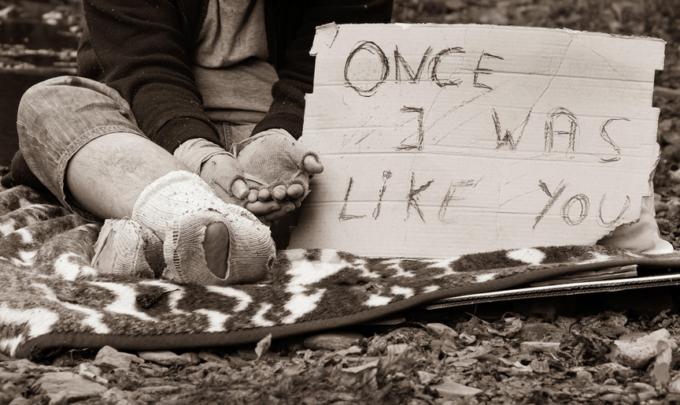
Faith
It’s human to think that we’re better than somebody. That’s why most of us need something -- or someone -- to remind us that we are all beggars before God.

Wolfe
I feel awkward -- and a little guilty -- whenever I encounter someone asking for money. And I'm pretty sure I'm not the only one. Even if it isn't ours, suffering makes us uncomfortable. So does poverty, dirt, and drunkenness.
There are a million reasons not to help. I don't want to support anyone's alcoholism or drug addiction. I don't want to be taken advantage of or put myself in a potentially dangerous situation. I don't have the time. I don't have the money. I see "Help Wanted" signs everywhere. Anything I could do wouldn't make much of a difference. But if I'm honest, something more insidious lurks behind all that: the desire to keep all I have because I've earned it.
How? I made better choices. I didn't break the law, take drugs, or surround myself with losers. I got an education, married, and did what I was supposed to do. And while I've made some mistakes -- maybe even a few doozies -- I worked hard enough to get myself back on my feet.
It's human to think that we're better than somebody. That's why most of us need something -- or someone -- to remind us that we are all beggars before God. That's why seeing the weathered guy holding a sign at the intersection or a tent under the overpass is exactly what I need. It's so easy to live inside a bubble and avoid contact with others, especially those I find unnerving or undesirable. Of course, that doesn't make them disappear. It just hardens my heart.
"Today, if you hear the voice of the Lord, harden not your heart." The Lenten antiphon to Psalm 95 says it all. We expect the voice of God to thunder. But as Elijah discovered, his voice is not in fierce winds, earthquakes, or fires. We are more likely to hear God in silence; it is in the voiceless -- especially in those who repel us or escape our notice -- that the God of glory thunders.
There will always be people in need, and God doesn't need our money or our time to help them. But he wants our hearts to be like his, full of compassion and mercy. Almsgiving is one of the ancient pillars of our Lenten disciplines because that is the fruit it produces in us.
The word "alms" has an interesting history. While we associate it with charitable gifts of money or food, alms comes from the Greek word for pity or mercy. It's the same word we use when we pray "Kyrie eleison," "Lord, have mercy." When we give alms, we are giving something more than money. We are giving to another person the same thing we ask God to give us: mercy. We are giving them a share of the mercy God has given us.
A friend and I have been visiting the women in a local jail for almost a year now. Every Monday evening, we provide a Catholic Church service to the women who sign up to come. We spend a little more than an hour with them, talking about the faith, praying for their needs, watching religious movies, and bringing them books, calendars, and Holy Communion.
That hour may not do much to change their lives. But it is certainly changing ours. In that crowded room, it's clear that there isn't a dime's worth of difference between any of us. We are all sinners in need of a savior, even if we aren't all behind bars. God operates there just as he does on the outside. He is merciful to all.
When I have a firm grasp of the truth that I'm not better than anyone else, I can see just how good God has been to me. And that's the one reason to give that's strong enough to overcome all the other reasons not to. Every good thing in my life flows from God's compassion and mercy. Why wouldn't I want to give that to others?
- Jaymie Stuart Wolfe is a Catholic convert, wife, and mother of eight. Inspired by the spirituality of St. Francis de Sales, she is an author, speaker, and musician, and provides freelance editorial services to numerous publishers and authors as the principal of One More Basket. Find Jaymie on Facebook or follow her on Twitter @YouFeedThem.
Recent articles in the Faith & Family section
-
Did you know?Father Robert M. O'Grady
-
Sowing the Seeds of FaithMaureen Crowley Heil
-
Bread left overScott Hahn
-
Scripture Reflection for July 28, 2024, Seventeenth Sunday in Ordinary TimeJem Sullivan
-
What the universal call to holiness entailsDr. R. Jared Staudt





